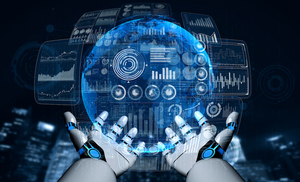What AI App Development Brings to Healthcare Solutions
Cuerpo
Artificial Intelligence (AI) has emerged as a revolutionary force across industries, and the field of healthcare is no exception. The integration of AI into healthcare solutions is transforming patient care, diagnostics, treatment, and overall healthcare management. AI app development is playing a pivotal role in creating applications that empower healthcare providers, improve patient outcomes, and enhance the efficiency of medical processes. In this blog, we will explore the profound impact of an AI app development company on healthcare solutions and the benefits it brings to both medical professionals and patients.
Diagnostic Precision and Speed
One of the key advantages of AI app development in healthcare is its ability to significantly improve diagnostic precision and speed. AI-powered apps analyze medical images, such as X-rays, MRIs, and CT scans, with remarkable accuracy. Machine Learning algorithms detect subtle patterns and anomalies that might be missed by the human eye, leading to earlier and more accurate diagnoses. This speed and precision can be crucial in critical cases where timely diagnosis can be a matter of life and death.
Personalized Treatment Plans
AI app development enables healthcare solutions that provide personalized treatment plans tailored to each patient's unique characteristics. By analyzing patients' medical history, genetics, and treatment outcomes, AI algorithms can recommend the most effective treatment options. These personalized plans optimize patient care by considering individual responses to medications, reducing the risk of adverse reactions, and improving treatment success rates.
Predictive Analytics for Early Intervention
AI-powered healthcare apps are equipped with predictive analytics capabilities that forecast potential health issues before they manifest. These apps analyze patient data, historical health records, and lifestyle factors to identify patterns indicative of diseases or health risks. By identifying these issues early, AI in healthcare providers can intervene proactively, preventing the progression of diseases and minimizing the need for extensive treatments.
Drug Discovery and Development
AI app development is revolutionizing drug discovery and development processes. These apps can analyze vast datasets to identify potential drug candidates, predict their efficacy, and assess potential side effects. This expedites the drug discovery process and enhances the chances of finding new treatments for various diseases, including rare conditions that previously received limited attention.
Remote Patient Monitoring
AI app development is facilitating remote patient monitoring through wearable devices and IoT (Internet of Things) integration. Patients can use these apps to track vital signs, symptoms, and health metrics from the comfort of their homes. AI algorithms analyze this data and provide real-time alerts to healthcare providers if any anomalies are detected, enabling timely intervention and reducing hospital readmissions.
Virtual Health Assistants
AI app development has given rise to virtual health assistants that provide patients with medical information, appointment reminders, and medication schedules. These assistants use Natural Language Processing (NLP) to understand and respond to patients' questions and concerns. They can also offer guidance on managing chronic conditions, adhering to treatment plans, and making healthier lifestyle choices.
Enhancing Medical Imaging Analysis
Medical imaging analysis is a labor-intensive task that AI app development is transforming. AI algorithms can analyze large volumes of medical images, identifying abnormalities and assisting radiologists in making accurate diagnoses. This not only speeds up the diagnostic process but also reduces the burden on healthcare professionals, allowing them to focus on more complex cases.
Administrative Efficiency
AI app development is not limited to clinical aspects; it also streamlines administrative tasks within healthcare organizations. AI-powered apps can automate appointment scheduling, patient registration, and billing processes. This efficiency reduces administrative workload, improves patient satisfaction, and frees up healthcare staff to focus on patient care.
Fraud Detection and Prevention
In healthcare, fraud detection is a significant concern. AI app development enables the creation of applications that analyze billing records, insurance claims, and transaction data to identify potential fraudulent activities. Machine Learning algorithms can detect unusual patterns and flag transactions that deviate from the norm, enhancing the integrity of healthcare financial processes.
Ethical Considerations and Data Security
AI app development in healthcare prioritizes ethical considerations and data security. Developers ensure that patient data is handled with the utmost privacy and complies with regulatory standards, such as HIPAA. AI algorithms that analyze patient data are designed to protect patient identities and maintain confidentiality.
Conclusion
AI app development is revolutionizing healthcare solutions, empowering medical professionals with tools that enhance diagnostic accuracy, treatment efficacy, and patient care. The integration of AI in healthcare not only improves medical outcomes but also drives operational efficiency, reduces costs, and transforms the patient experience. As AI technology continues to advance, the collaboration between AI app development and healthcare solutions is poised to shape the future of medical practice, research, and patient well-being.













Comentarios